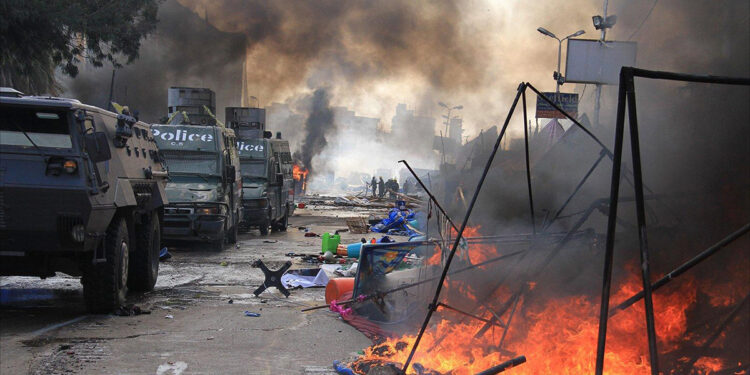Egyptian courts continue to issue severe sentences against hundreds of detainees in connection with the violent military dispersal of the Rabaa al-Adawiya sit-in in August 2013 — one of the bloodiest events in Egypt’s modern history.
In this context, the Cairo Criminal Court sentenced eight detainees to 10 years of aggravated imprisonment during retrial proceedings on charges related to gathering during the Rabaa sit-in, which called for rejecting the military’s removal of elected president Mohamed Morsi.
The case includes former officials, ex-parliamentarians, public figures, and members of opposition political groups, as well as academics, physicians, engineers, students, and media professionals. Among those implicated are prominent figures such as Safwat Hegazy, Essam al-Iryan, Mohamed al-Beltagy, and Essam Sultan, among others.
Human rights assessments point to a serious imbalance in the justice process, noting that hundreds of civilians are being tried solely for participating in a political sit-in, while no independent investigation has ever been opened into the extensive and lethal use of force during the dispersal, despite the enormous number of victims.
Trying such a vast number of individuals in a single mass trial, involving charges carrying political overtones, raises major concerns regarding the right to defence, fair trial guarantees, and the assessment of individual evidence for each defendant.
Furthermore, the lengthy sentences issued against minors represent an aggravated violation, given the state’s legal obligation to apply special measures that prioritise the best interests of children and prevent the imposition of severe punishments.
These rulings reflect a broader judicial process tainted by legal loopholes, enabling the continuation of collective punishment against wide sectors of political opposition, while shielding authorities from accountability for the grave human losses resulting from events unprecedented in modern Egyptian history.
The latest judgment comes within one of the most extensive political cases in Egypt over the past decade, in which 739 individuals were tried for opposing the army’s removal of the civilian president in 2013.
The same court had previously issued death sentences against 75 defendants, and imposed 25-year sentences on others, along with 10-year sentences on additional defendants, including journalists such as photojournalist Shawkan, and 5-year sentences on others.
Aggravated prison sentences of between 5 and 15 years were also issued against hundreds of detainees, with 32 defendants sentenced in absentia. The case file included others who died in detention before their trials concluded.
Although the Rabaa dispersal resulted in the killing of over 1,000 civilians, according to credible estimates, the indictment list contains no accusations against any security or military personnel involved in planning or executing the operation. Instead, the charges were limited to well-known public figures who opposed the military’s measures, in addition to hundreds of detainees arrested during the dispersal.
This highlights the absence of independent investigations into the use of lethal force during the operation, despite the staggering number of victims.
These developments underscore the urgent need for an independent and transparent investigation into the dispersal and the widespread arrests that followed, as well as the need to ensure fair, individualised trials for all defendants, away from politically motivated charges and mass indictments.


























